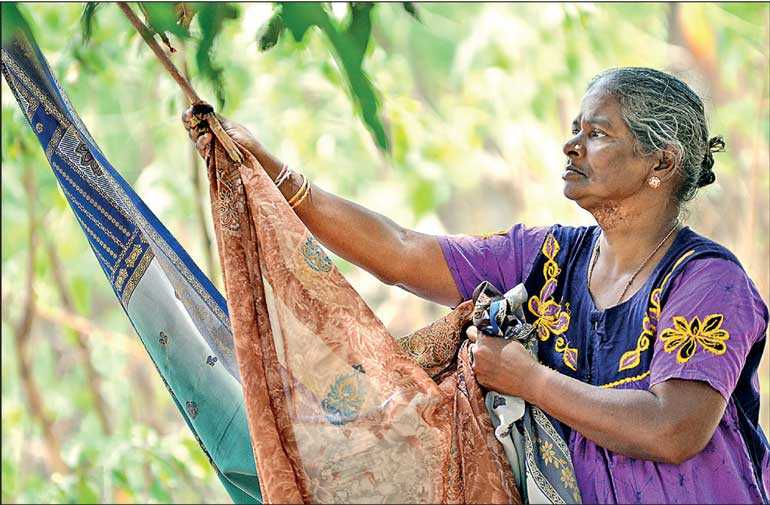Wednesday Feb 25, 2026
Wednesday Feb 25, 2026
Saturday, 8 May 2021 00:07 - - {{hitsCtrl.values.hits}}

We hope to find out the humanitarian day-to-day needs of the people, beyond the boundaries of local and international politics – Pic by Shehan Gunasekara
By Surya Vishwa
The Harmony page has been since last month featuring articles from the north-east of Sri Lanka and pertaining to ethnic and religious harmony as well as human wellbeing. We have promoted the concept of dedicating May as a month of peace in Sri Lanka as the nation marks the 12th year of defeating terrorism. Below is the link of the Harmony page article of last week and several related editions.
http://www.ft.lk/harmony_page/Celebrating-May-as-a-month-dedicated-to-peace/10523-717115
http://www.ft.lk/front-page/A-Catholic-priest-of-Mannar-shares-insights-to-spirituality-and-peacebuilding/44-716331
http://www.ft.lk/harmony_page/Winning-the-war-of-minds-is-more-important-than-winning-the-war-of-arms/10523-714286
http://www.ft.lk/harmony_page/What-Sri-Lanka-can-learn-from-Deshabandu-Jezima-Ismail/10523-715084
 The past article links are provided here to create the related awareness needed among the reader as we embark on what we want to communicate this week.
The past article links are provided here to create the related awareness needed among the reader as we embark on what we want to communicate this week.
In the next few weeks, the Harmony page hopes to continue the detailed research it started last month in the interior of the north-east of Sri Lanka, especially in now almost forgotten areas such as Mulliwaikkal, the last bastion of the war. We hope to find out the humanitarian day-to-day needs of the people, beyond the boundaries of local and international politics.
Our last week’s article will reveal some of the difficulties faced by the people. It will also reveal the perseverance, the courage and the incredible potential of using the north-east human capacity for the economic wellbeing of not just that region but the entire Sri Lanka.
Sri Lanka is the only country in the world which provided amnesty and pardoned an entire fighting force of an internationally proscribed terror organisation. Although receiving skill training and successfully de-radicalised, and re-integrated back to society, and today leading peaceful lives, these individuals and their families face much difficulty, with lack of employment opportunity. This has led to suicide and mass scale depression which is a phenomenon that should not occur in any country, especially a country which is known as a Buddhist country.
To reverse this situation all it takes is some genuine commitment. We should stop merely waiting for Western foreign agencies or foreign donors to look into the wellbeing of our people. Our people are our people. Whether they are Sinhalese, Tamils, Muslims or Burghers. Sri Lanka can easily eradicate poverty whether in the north or south if every profit-making business institution in this country undertakes to assist in the entrepreneurship creation of each poverty-stricken family.
This is what the Harmony page hopes to encourage with the support of Nisthar Cassim, the editor of the Daily and Weekend FT. In what we hope will be a sample media initiative in Sri Lanka the Harmony page will assist Sri Lankan youth such as university students and others, especially between the ages of 18 and 25 to create the link between private companies and families in the north and south.
In the north it will be families such as the beneficiaries who were rehabilitated and integrated back to society and those who are disabled. As needed, we will be in contact with the related institutions of the Sri Lankan Government for security and other considerations, following normal protocol. In the southern areas we are aware that there are still families in acute poverty and that some of these families have a history of being involved in the 1971 and 89 Marxist insurgency.
The way this wellbeing assistance model will work is as follows:
We would like all individuals and companies who would like to support this endeavour to contact Nisthar Cassim on [email protected] and Surya Vishwa on 0777 27 33 95. The facilitator of this initiative, Surya Vishwa, will not at any point get involved in handling money. Her role is only as the creator of the concept and as the mobiliser and facilitator. The financial interaction is purely between the business company volunteering the support and the beneficiary.
As a policy this initiative will not include any INGO or NGO or foreign agency support. This is an initiative that will encourage and motivate Sri Lankans to take responsibility for fellow Sri Lankans and for the wellbeing of their country. If INGOs or NGOs or foreign agencies which to support the people of the north as well as rural south using the information of our research on the day-to-day difficulties faced by them, they could do so directly with the people concerned, in collaboration with the Sri Lankan Government. Where needed we can support this facilitation.
We encourage Sri Lanka’s retired military officials who are now working in the private sector to assist us.
(The author/concept developer is a Sri Lankan who strives to transcend beyond inherited birth identity. She has a keen interest in comparative spirituality and indigenous knowledge. Her academic training has been in sociology and she is a curriculum writer and visiting lecturer in Mass Communication at a national university in Sri Lanka under her inherited family name. She has for over 20 years worked as a writer for local and international publications and has been associated with the peace building/training sector. Her library of 15,000 books, of which a large number is on global literature, science, comparative religions and secular spirituality has been opened up for the public free of charge. She cultivates trees using ancient biodiversity centred methods of cultivation and promotes the concept of ‘Integrated Knowledge’ linking diverse aspects of knowledge to create stimulating thinking and innovative practical initiatives that benefit the individual as well as the country).